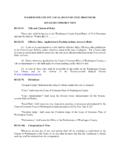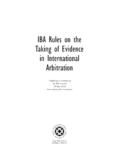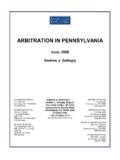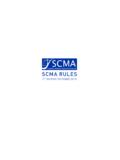Transcription of IN THE LABOUR COURT OF SOUTH AFRICA, …
1 REPUBLIC OF SOUTH africa . IN THE LABOUR COURT OF SOUTH africa , JOHANNESBURG. JUDGMENT. Reportable Case no: JR 90/2012. In the matter between - XSTRATA COAL SOUTH africa Applicant And THE COMMISSION FOR CONCILIATION. MEDIATION AND arbitration First Respondent COMMISSIONER JACOBUS DELPORT Second Respondent NATIONAL UNION OF MINE WORKERS Third Respondent ABEL NKOSI Fourth Respondent Date of hearing: 16 August 2013. Date of judgment: 07 February 2014. Summary: Review application. arbitration award reviewed- Commissioner failed to appreciate the issue before him. Commissioner assumed the case concerned proof that employee was unable to perform his duties due to alcohol intoxication. Charges against the employee concerned breach of policy of zero tolerance to reporting for work with any amount of alcohol in the employee's blood system. _____. JUDGMENT. _____. 2. MOLAHLEHI J. Introduction [1] This is an application to review and set aside the arbitration award made under case number MP 239-11 dated 1 December 2011, in terms of which the second respondent, (the Commissioner ) found the dismissal of the fourth respondent (hereinafter referred for ease of reference as the employee ) to have been unfair and ordered that he be reinstated.
2 Background facts [2] The employee was prior to his dismissal employed as an engineer attendant. He was charged and dismissed for the offence of misconduct relating to having tested positive for alcohol intoxication in the mine premises.. [3] The standard of conduct which the employee was accused of having breached is set out in the Alcohol and Intoxicating Substances Testing Policy. The objective of the policy is to ensure safety and welfare of employees and visitors at the mine and was done in accordance with Cardinal Rule No 1, which reads as follows: We will always come to work free from influence of alcohol; or drugs.. [4] Clause 2 of the policy provides: In terms of section 5 of the Mine Health and Safety Act No 29. of 1996 ( the MHSA ), the Company is required to maintain an environment, as far as is reasonably practicable, that is safe and without risk to its employees as well as those persons who may be affected by the activities which occurs at its Mines.
3 The 3. negligent failure to comply with the statutory obligation thereby endangering the life of any person at a Mine can constitute an offence in terms of Section 86 of the MHSA. XCSA recognises that an employee reports to work (with the intention of commencing duty), commences duty or enters the companies premises under the influence of intoxicating substances is a potential hazard to himself/herself as well as to his/her the employees, and to any other person. In addition, such person poses a risk to the company's assets. XCSA recognises and accept that a zero tolerance policy is necessary and should be consistently applied to all its premises. This means a reading of ZERO (irrespective of the measurement scale) this means a person tested should not receive a positive result.. [5] The essence of the above policy is that it prohibits an employee from presenting himself for work when he or she has any amount of alcohol in his or her blood system.
4 The policy also provide for self- testing by employees before entering the workplace if they had at any stage taken alcohol or drugs. [6] In the present instance the employee did not do his self-test when he entered the workplace on 25 November 2010. He was tested for alcohol after entering the workplace and was found to have alcohol in his blood system. Grounds for review [7] The applicant contends that the arbitration award is reviewable in terms of section 145 of the LABOUR Relations Act of 1995, in that the Commissioner failed to apply his mind to the evidence which was 4. properly placed before him. The other point raised by the applicant in challenging the arbitration award is that the Commissioner ignored materially relevant evidence which was placed before him and took into consideration irrelevant material concerning whether the employee could do his work despite the alcohol content in his blood system. The arbitration award [8] In arriving at the conclusion that the dismissal of the employee was unfair the Commissioner reasoned as follows: [59] However, the test results in itself are not sufficient to prove that the Applicant was under the influence of alcohol when he reported for duty.
5 The only observation made in respect of the Applicant's state of sobriety was a slight smell of alcohol in the Applicant's breath, but apart from that there was no other indication that the Applicant's actions way influenced by the use of alcohol.". [9] The Commissioner further relied in his reasoning on the decision of the LABOUR Appeal COURT in Tanker Services (Pty) Ltd v Magudulela1 where the COURT is quoted as having said: An employee is under the influence of alcohol if he is unable to perform the task entrusted to him with the skill entrusted to him or with the skill of a sober person. The evidence required to prove that a person has infringed the rule relating to the consumption of alcohol or drugs depends on the offence with which he is charged. If employees are charged with being under the influence, the evidence must be to prove that their faculties were impaired to the extent that they were incapable of working properly.. 1 1997 (2) BLLR 1552 (LAC).
6 5. Evaluation [10] In considering this review application the test to be applied is that of a reasonable decision maker as set out in Sidumo v Platinum Mines Limited and The inquiry to conduct is whether the decision reached by the Commissioner is one that a reasonable decision maker could not have reached. The totality of the facts and the circumstances of the case as was presented before the Commissioner plays a role significant in deciding whether there is a basis for interfering with the arbitration award. [11] In the present instance it is apparent from the reading of the arbitration award that the Commissioner misconceived the issue he was tasked to determine. He confused the issue of being charged for being under the influence of alcohol and being unable to perform duties as a result thereof with the charge envisaged in the cardinal rules which is zero absence of alcohol in the blood system of an employee. [12] The two key issues which amongst others the Commissioner had to determine is set out in the pre- arbitration minutes in the following terms.
7 Whether the Respondent (Applicant in the present matter) has a zero tolerance for any level alcohol in the employees' (blood). system or it has zero tolerance against reporting for duty being under the influence of alcohol. 2 [2007] 12 BLLR 1097 (CC). 6. Whether or not the Applicant (the employee) had alcohol in his (blood) system and if there was whether such alcohol exceeded the required limit.. [13] The existence and the reasonableness of the rule governing the conduct as set out in the cardinal rules was not disputed by the employee. Put in another way, the employee was aware of the cardinal rules and did not raise any issue regarding its reasonableness. In fact the record shows that the employee signed a Health and Safety Risk Conversation Training form confirming that he was made aware of the risk and precautionary measures concerning the cardinal rules. [14] The issue that the employee had alcohol in his blood system was also not disputed.
8 During the disciplinary hearing the employee raised as a defence that the alcohol content in his blood system was due to the medication, known as Lerumo la Madi, which he had taken before reporting for work. This defence was not pursued during the arbitration proceedings. The tests which were conducted indicated that the content of alcohol in the employee's blood system was at the levels and employee did concede during cross examination that the objective of the cardinal rules was safety. [15] As concerning the substance of the issue which the Commissioner had to determine the following was put to the employee by the representative of the applicant: So you will agree with me then Mr Nkosi that, it was wrong for any employee to arrive at work with alcohol in his system? The employee responded as follows: Yes it is totally wrong .. 7. [16] In addition to the breathalyser tests which were conducted it was not disputed that the employee had an alcohol smell which in a sense confirmed the results of the breathalyser test.
9 It therefore follows that the employee had failed the zero tolerance alcohol tests. [17] It is apparent from the above that had the Commissioner applied his mind to the issue of the policy regarding alcohol and drugs at the workplace he would have found that the employee was guilty of contravening the policy regarding the zero content in his blood system when entering the mine premises. On his own version the employee knew about the rule governing the blood contents in his blood system when attending at work. He also knew about the self -testing procedure if one had taken any amount of alcohol at any time before reporting for work. He was also aware that he could have avoided contravention of the rule by conducting self-testing. He also knew that the underlying objective of the policy had to do with safety. [18] In addition to the above, the Commissioner would, had he appreciated the task that confronted him, have found that the dismissal imposed by the applicant was an appropriate sanction taking into account the following factors: a.
10 The employee knew about the rule and more importantly that its objective was to ensure safety at the workplace. b. That the employee had an opportunity of avoiding the breach had he been honest to himself by conducting self- testing before entering the mine premises. 8. [19] In light of the above, I am of the view that, the applicant has made out a case justifying the finding that the Commissioner's decision was unreasonable and that he committed gross irregularity in failing to appreciate the material issue he was expected to deal with. Order [20] In the premises, the following order is made: 1. The arbitration award under case number MP 239-11 dated 1. December 2011 is reviewed and set aside. 2. The arbitration award is substituted with the order to the effect that the dismissal of the fourth respondent was for a fair reason and accordingly the claim of unfair dismissal is dismissed. E Molahlehi Judge of the LABOUR COURT of SOUTH africa 9. APPEARANCES: For the Applicant: Mr B Masuku of Tabacks Attorneys For the Respondent: Adv T Setshosa Instructed by M.
















